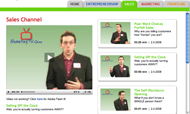
 You probably don’t have the money to hire McKinsey.
You probably don’t have the money to hire McKinsey.
But you still want to make your company more equitable, more profitable and more successful, right?
Cool.
Well then, if you’re willing to invest your time and mental energy (but not so much money!) consider this option:
What if you became your OWN consultant?
I know. It sounds impossible.
After all, the whole point of hiring a consultant is to bring someone ELSE into your company, right?
Well, to a certain extent, yes.
However, the word “consultant” stems from the Latin consultare, which means, “To deliberate or consider.”
And you don’t necessarily need some MBA in a suit to do that for you.
Now, sure, I believe in The Outsider Advantage. And I believe there are lots of AMAZING consultants out there.
Heck, I even have a consulting department myself.
But I also believe that successful entrepreneurs learn how to practice objective deliberation on their own.
Because (most of) the answers lie within.
– – –
So, even though it’s not the same thing as brining in some suit from a Fortune 500, your company still can reap the benefits from a little self-consulting.
Especially if you do it regularly.
NOTE: I’m not suggesting you abandon your relationships with mentors, advisors and other members of your professional support system. Nor am I suggesting that self-consulting is a replacement for that support system.
I merely implore you to consider yourself as your company’s most valuable consultative resource.
That being said, let’s explore a list of five practices to help you become your own consultant.
1. Begin with objectivity. The primary value of hiring an outside consultant is BECAUSE she comes from The Outside. This means she has little or no bias. This means she can deliver independent thought. And this means she can recognize patterns immediately.
Obviously, this is a LOT harder to do when it’s just you. Especially since you’re so close to the situation.
So, your challenge is to operate on multiple planes of consciousness. To avoid emotional reactivity. To detach yourself so you can objectively and honestly consider your own criticism.
Kind of like Michael Gerber suggests in The E-Myth: “You need to be the creator, the manager and the technician … simultaneously.”
ASK YOURSELF: Are you willing to step back and examine your company’s challenges calmly and objectively?
2. U-NEED-2-READ. Every single day, spend at least fifteen minutes reading, annotating and studying books that facilitate self-exploration. Books that ask you questions. Books that challenge you. Books that make you sit back and think.
Consider these titles to get your success library started. I’ve personally had breakthrough moments of company knowledge with each one:
o The Aladdin Factor
o Flight Plan
o The Mentor’s Spirit
o Ordering Your Private World
o Questions that Work
o Thinking for a Change
Also, once you’ve marked up your books, the next step is to customize a personal system for transcribing your thoughts. I suggest recopying or summarizing your notes, keeping them in a folder – physically or virtually – and revisiting them regularly. This will keep those self-consultative thoughts fresh in your mind.
ASK YOURSELF: How many books did you read last month?
3. Ask the right questions. Questions are the basis of all knowledge, understanding and creativity. And if you want to be your own consultant, remember that questions are the answer.
So, I suggest doing three things.
First, consider 3-5 vital areas of your business. Everything from marketing to sales to blogging to managing employees.
Next, make a list of pointed, specific and penetrating questions that correspond to each “department.”
Then, ask away!
Now, each book mentioned in the previous example has a WEALTH of great questions. But, if you’re still not sure what to ask, no worries! Here are a few mini lists to get you started:
LEADERSHIP QUESTIONS
o How much are you promoting your own personal agenda?
o Can you clearly define what you are a steward of?
o Have you considered other alternatives to this value and explored them fully?
MANAGEMENT QUESTIONS
o How are you creating a non-threatening workplace?
o How are you creating a question-friendly atmosphere?
o How do you create an environment in the workplace that encourages the generation and application of your best ideas?
MARKETING QUESTIONS
o How are you allowing customers to participate in your brand?
o How are you building a following?
o How are you building a permission asset?
SALES QUESTIONS
o Are you using informational, value-added follow-up?
o Do you know where your leads are coming from?
o Are you spending more time educating potential customers on the benefits of your service, or telling them why you are better than the competition?
ENTREPRENEUR QUESTIONS
o What “little things” made a big impact on your business?
o What are the best people in your field doing?
o What are the most important things for you to work on that will grow your business the fastest?
4. Hit the page. If you are TRULY serious about becoming your own consultant, the most important practice you can undertake is writing. Especially since you’ve already been reading great books and asking great questions, writing is the logical next step!
“Yeah, but I’m not a writer,” you say.
Yes you are. Everyone is a writer. Writing is the basis of all wealth.
So, here are my three best suggestions for using the practice of writing to become your own consultant:
o Learn to do Morning Pages, the best writing/creativity exercise in the world!
o After asking your questions from example #3, put each your answers in writing. Store your document according to topic in a folder called, “Consulting Me.”
o For any other form of writing you do (as it pertains to consulting yourself), make lists. Lists for everything! And why? Well, consider these 43 reasons.
ASK YOURSELF: What did you write today?
5. Let everything mentor you. OK, we’ve talked about detachment, reading, questioning and writing as four effective practices to help you become your own consultant. For our final example, here’s another self-consultative exercise you can use throughout your day when you’re NOT reading, writing or questioning.
Let’s go back to that list of books for a sec. One in particular, The Mentor’s Spirit, has a FANTASTIC philosophy about self-consulting. Author Marsha Sinetar suggests that you “search out the mentor’s spirit in everyone and everything.” A few other great keepers from her book include:
o “Don’t be afraid of being a little unreasonable with yourself.”
o “Value silence for creative discovery and personal renewal.”
o “We grow by living with our questions, not by having all the answers.”
o “Search each current and particle of existence for truth.”
ASK YOURSELF: How can I let this experience, person or thing mentor me?
– – –
REMEMBER: If you’re willing to invest your time and mental energy, acting as your own consulting CAN pay off BIG time.
It will increase your self-knowledge.
Which will increase your confidence.
Which will increase your company’s equity.
Which will increase your company’s profitability.
And you won’t even need to hire someone from McKinsey!
LET ME ASK YA THIS…
How do serve as your own consultant?
LET ME SUGGEST THIS…
For a copy of my Top 100 Self-Consultative Questions, send an email to [email protected] and I’ll send you the list for free!
* * * *
Scott Ginsberg
That Guy with the Nametag
[email protected]
 How many unsolicited referrals did YOU get this week?
How many unsolicited referrals did YOU get this week?
Tune in to The Sales Channel on NametagTV.com!
Watch video lessons on enabling customers to buy!
